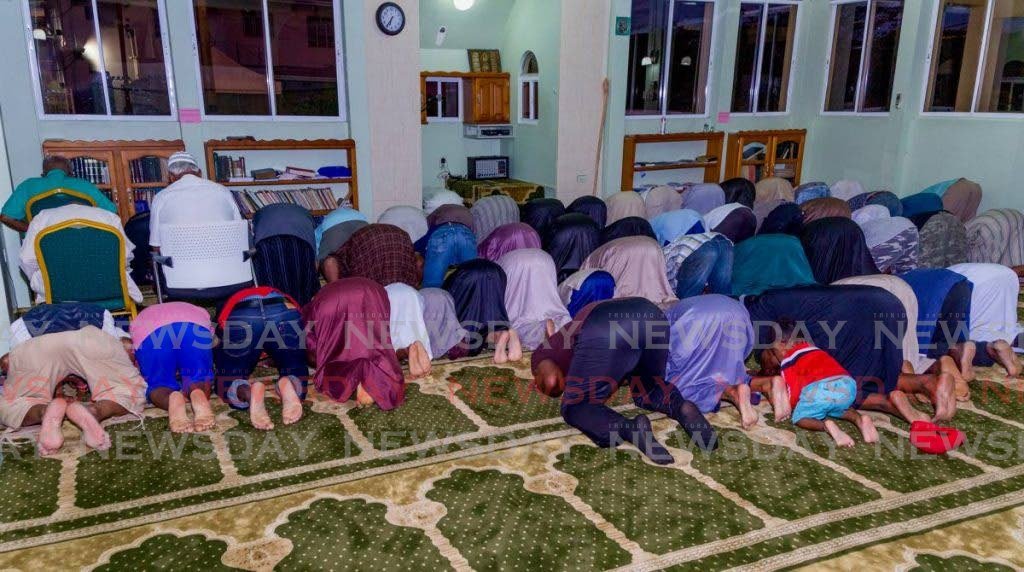Fasting and Ramadan explained

THE EDITOR: Muslims all over the world, including the TT Muslim community, have begun the month-long period of fasting. This is the second year fasting is being done during the covid19 pandemic. Last year, all houses of worship were closed, so this year it is hoped that the taraweeh (nightly Ramadan prayers) at the mosque has resumed with the health protocols being observed.
Ramadan is the most sacred month of the year in the Islamic culture. In addition to spiritual fulfilment, the act of fasting is meant to remind Muslims of the less fortunate and to reinforce the need to be thankful.
What is Ramadan?
Ramadan is the ninth month of the Islamic calendar and a time when Muslims are obliged to observe one of the five pillars of Islam – fasting. Each day during Ramadan, from dawn until the sun sets, Muslims abstain from eating, drinking, smoking, sexual relations or engaging in any acts deemed to be ill-natured or excessive.
The fast begins each day at suhoor (just before sunrise) and ends at iftar (directly after sunset). It was during the month of Ramadan that the Holy Qur’an was revealed to the Prophet Muhammad (peace be upon him) as guidance for mankind.
When does Ramadan start?
The start of Ramadan is based on the Islamic lunar calendar, so each year it moves forward approximately ten or 11 days, depending on the sighting of the new moon. The fasting phase finishes on the sighting of the next new moon, which takes place after 29 or 30 days.
When does Ramadan end?
Ramadan ends after 29 or 30 days, depending on the sighting of the new moon. The end of Ramadan is marked by the celebration of Eid-ul-Fitr, the festival of breaking the fast. It occurs on the first day of the next lunar month, Shawwal, and begins with special prayers at the mosque, the gathering of families and friends and celebratory meals. It is also a special time to ask for forgiveness and make amends.
Is fasting in Ramadan compulsory?
Fasting during the month of Ramadan is mandatory for all healthy adult Muslims. Those exempt from fasting are:
* Children who have not reached puberty
* The elderly
* Those who are physically or mentally incapable of fasting
* Pregnant women
* Breastfeeding mothers
* Travellers
What are the benefits of fasting?
In removing the comforts of daily life, fasting essentially focuses on purifying the body and mind, increasing spirituality and strengthening faith. The rewards during fasting are believed to be multiplied during the auspicious month of Ramadan. Muslims increase their reading of the Holy Qur’an and offer special nightly prayers.
For the hundreds of millions of Muslims around the world who observe Ramadan, the month is a time to focus on our faith and also perform generous acts. People raise money and donate supplies to help others in need. And many fast to remind themselves about those in the world who don’t have enough to eat.
How many hours do Muslims fast?
Normally from dawn to sunset. In TT, fasting is about 14 hours. However, in other countries the hours can vary depending on the season of the year.
What does a day in Ramadan look like?
It is recommended that before sunrise, Muslims eat a pre-fast meal known as suhur. After sundown, Muslims break their fast with iftar, a meal which usually starts with dates and water, followed by dinner. Muslims are permitted to snack at night between those two meals, and hydration is encouraged.
The fast of Ramadan is a lesson in humility. Participating in the fast teaches everyone exactly how difficult it is be hungry, for one day, or many days, one after the other. It tests our patience with ourselves and others and our commitment to an idea or belief.
Make no mistake, for Muslims, too, all one billion of us, the fast is an ordeal, but one that we welcome and adhere to out of religious commitment and the sense of umma or global community that arises during the holy month of Ramadan.
MIRZA ALI-MOHAMMED
president
Islamic Da’wah Movement of TT


Comments
"Fasting and Ramadan explained"